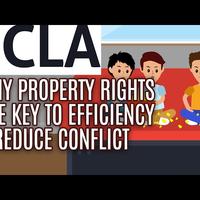Essential UCLA School of Economics: Why Property Rights Are Key to Efficiency and Reduce Conflict
Imprescindible Escuela de Economía de la UCLA: Por qué los derechos de propiedad son clave para la eficiencia y reducen los conflictos
UCLA経済学部の本質なぜ財産権が効率性の鍵であり、紛争を減らすのか?
Essencial da Escola de Economia da UCLA: Porque é que os direitos de propriedade são fundamentais para a eficiência e reduzem o conflito
Основные положения Школы экономики Калифорнийского университета: Почему права собственности являются ключом к эффективности и уменьшению конфликтов
Temel UCLA Ekonomi Okulu: Mülkiyet Hakları Neden Verimliliğin Anahtarıdır ve Çatışmaları Azaltır?
Essential UCLA School of Economics: Чому права власності є ключем до ефективності та зменшення конфліктів
加州大学洛杉矶分校经济学院必修课:为什么产权是提高效率和减少冲突的关键?
Welcome to the essential ideas of the UCLA School of Economics.
One area where UCLA economists made enormous contributions was how property rights help
Однією з областей, де економісти Каліфорнійського університету зробили величезний внесок, було те, як права власності допомагають
solve economic problems, reducing conflict and promoting the efficient use of resources.
resolver problemas económicos, reduzindo os conflitos e promovendo a utilização eficiente dos recursos.
вирішувати економічні проблеми, зменшуючи конфлікти та сприяючи ефективному використанню ресурсів.
Harold Demsetz, a key member of the school, was one of the first to write about the “tragedy
Harold Demsetz, um dos principais membros da escola, foi um dos primeiros a escrever sobre a "tragédia
Гарольд Демсец, ключовий член школи, був одним з перших, хто написав про "трагедію
of the commons,” which explains that when property is owned by everyone communally, it
dos bens comuns", que explica que quando a propriedade é detida por todos em comum, ela
спільності", яка пояснює, що коли майно перебуває у спільній власності, воно
will be overused and used ineffectively. Demsetz observed that when property is privately owned,
serão utilizados em excesso e de forma ineficaz. Demsetz observou que quando a propriedade é privada,
буде зловживати і використовуватись неефективно. Демсец зауважив, що коли власність перебуває у приватній власності,
and people directly benefit from its ownership, property owners have much stronger incentives
e as pessoas beneficiarem directamente da sua propriedade, os proprietários têm incentivos muito mais fortes
і люди отримують безпосередню вигоду від володіння нею, власники нерухомості мають набагато сильніші стимули
to use it wisely and effectively. Let's explore the importance of property
rights using an example. Imagine a small lake with a water skiing school on one side
direitos utilizando um exemplo. Imagine um pequeno lago com uma escola de esqui aquático numa das margens
and a fishing lodge on the other. Neither has property rights to the lake.
e um pavilhão de pesca no outro. Nenhum dos dois tem direitos de propriedade sobre o lago.
The water skiiers interfere with the people fishing, hurting their business.
Os praticantes de esqui aquático interferem com as pessoas que pescam, prejudicando o seu negócio.
Водні лижники заважають людям рибалити, завдаючи шкоди їхньому бізнесу.
And similarly, the people fishing interfere with the water skiiers and hurt their business. The two
Da mesma forma, as pessoas que pescam interferem com os esquiadores aquáticos e prejudicam o seu negócio. Os dois
businesses have tried to negotiate but, without property rights, a permanent solution is unlikely.
As empresas tentaram negociar mas, sem direitos de propriedade, é improvável uma solução permanente.
But now let's imagine that each was given property rights over half the lake.
Mas agora imaginemos que a cada um deles foram concedidos direitos de propriedade sobre metade do lago.
Suddenly, many potential solutions are possible.
De repente, muitas soluções potenciais são possíveis.
The fishing lodge might offer to buy the water ski business—or vice versa.
O alojamento de pesca pode oferecer-se para comprar o negócio de esqui aquático - ou vice-versa.
Whichever business valued the lake more, would likely buy the other out,
L'entreprise qui valorise le plus le lac rachète probablement l'autre,
A empresa que valorizasse mais o lago, provavelmente compraria a outra,
leading to the most effective use of the lake. Alternatively, the two businesses might agree
que conduzam a uma utilização mais eficaz do lago. Em alternativa, as duas empresas poderão chegar a acordo
to a buffer between their two sides to better accommodate both activities, or the fishing lodge
a um tampão entre os dois lados para melhor acomodar ambas as actividades, ou o pavilhão de pesca
might pay the water skiing school to operate only during off-season periods, which would
poderia pagar à escola de esqui aquático para funcionar apenas durante a época baixa, o que
reduce conflict between the two. The presence of property rights allows for such negotiations.
reduzir o conflito entre os dois. A existência de direitos de propriedade permite essas negociações.
Much of the work of the UCLA School of Economics focused on the importance of having well-defined
Grande parte do trabalho da Escola de Economia da UCLA centrou-se na importância de ter
private property rights to reduce conflict and promote the efficient use of resources.
direitos de propriedade privada para reduzir os conflitos e promover a utilização eficiente dos recursos.
For more information on the UCLA economics visit EssentialUCLAeconomics.org, and to learn about
more essential scholars, visit EssentialScholars.org
mais académicos essenciais, visite EssentialScholars.org

